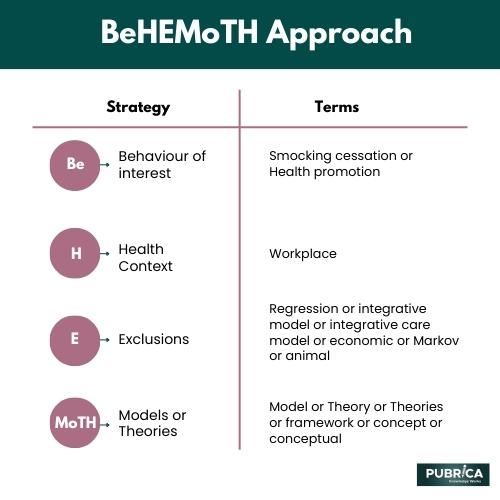BeHEMoTh Behaviour; Health context; Exclusions; Models or Theories
BeHEMoTh is used to frame questions when you are looking for specific models or theories to inform your research.
- The behaviour of interest: To determine the behaviour of interest in a research question, you need to identify the specific action, reaction, or response you want to investigate or measure. This behaviour should be clearly defined and observable to be measured objectively. In general, the behaviour of interest in a research question should be specific, measurable, and relevant to the research question at hand.
- Health Context: This term refers to the various factors and conditions that can influence a person’s health and well-being, such as social, economic, cultural, and environmental factors, as well as individual behaviours and genetics.
- Exclusions: In research or study, “exclusions” refer to specific criteria or conditions that prevent individuals or data from being included in the analysis. For example, in a clinical trial, specific individuals may be excluded from participating due to pre-existing medical conditions or other factors that could impact the study’s results.
- Models or Theories: In the context of behavioural science, “models” or “theories” refer to frameworks or explanations that attempt to describe or predict human behaviour. Examples of theories in this field include social learning, cognitive-behavioural, and transtheoretical models. Models can be used to guide research, develop interventions, or explain observed behaviour patterns.

| Behaviour of interest | You’ve observed your population interacting with the health context you’ve chosen. Which of these behaviours or attitudes are you investigating? |
| Health context | Which intervention, service, program or policy are you focusing on? |
| Exclusions | How are you going to exclude non-theoretical or technical models from your search if necessary? |
| Models or Theories | Have you identified relevant models or theories? If so, use their names, including variants. Are you searching for relevant models or theories as yet unknown? If so, you’ll need to use model, models, theory, theories and synonyms as keywords in your search. |
References
Booth, Andrew, and Christopher Carroll. “Systematic searching for theory to inform systematic reviews: is it feasible? Is it desirable?.” Health Information & Libraries Journal 32.3 (2015): 220-235.
